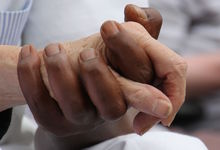Pastoral care (22): Crisis intervention—it doesn’t get harder than this
An accident. Three young people were in a car. They were joking around and the driver was distracted. Suddenly he lost control, the car went off the road, and hit a tree. The passengers died at the scene.

A terrible scene from daily life. There is a great deal of commotion at the scene of the accident. Police, firefighters, paramedics, and a crisis intervention team—as well as onlookers and the press. In the middle of all this commotion are the parents, who have in the meantime been informed by the police. Who is looking after them? It immediately becomes clear that this is a case for a trained emergency chaplain, because not only have people died, but suffering and grief have also entered the homes of the affected families.
First aid for the next of kin
The emergency chaplain’s only job at the scene is to be there for the next of kin. His focus is on them, directly and exclusively. He listens and shows compassion and empathy. Pastors in crisis intervention without empathy are unimaginable. Their most important task is to give the next of kin a protected space and provide support. Shock and panic have set in, changing people physically and mentally. What they need now is calmness and confidence, and to have their ability to act and react restored. The emergency chaplain writes down the next important steps and explains them to the families. He or she is there for them, available to answer any questions until other relatives arrive—but only as long as he or she can cope with the situation.
Taking care of yourself
One thing is certain: “Death and suffering never become routine.” This is what a Priest of the New Apostolic Church says, who volunteers as a first response chaplain. To protect himself during such emergencies, he follows a code of safe practice that automatically unreels in his head when a call comes in: alert – call back the control centre – find the route – put on your shoes. What is interesting is that after he as responded to a critical incident, he makes a point of changing his clothes, washing his hands, and documenting the incident. The documentation helps him to sort out and process the impressions. And, of course, he has the right to request psychological support for himself at any time.
Pastoral care is a matter of the heart
Situations such as the one described above happen often. Pastoral care is very important, without it the world would be a darker place. And even if the individual cases are very different, there are clear and unequivocal rules that pastoral care also in emergencies must follow.
- Without trust it just will not work! If the emergency chaplain is not trustworthy, he cannot help. On the contrary, he can make an already critical situation even worse.
- Pastoral care without skills is powerless in the face of a critical incident. Of course, the ability to listen or show compassion is somehow given to every human being, but an emergency chaplain does not just keep quiet—he or she really listens. Active listening means engaging with your conversation partner and fully concentrating on what is being said. This is done by asking questions, but above all by listening.
- It is good if pastoral care is based on a secure position. People who work in the field of pastoral care have to be emotionally balanced themselves. Calm people emanate a peaceful and pleasant aura.
- Pastoral care also requires consistency. Typical phrases such as “It’s your own fault, you should have been more careful” are just not acceptable. Similarly, lack of time, lack of availability and personal commitment, and lack of experience are disruptive factors.
These few points show that effective pastoral care is a skill that has to be learned. This is an assignment for all who work in the field of pastoral care.
The next article in this series will examine pastoral care following an abortion.

























